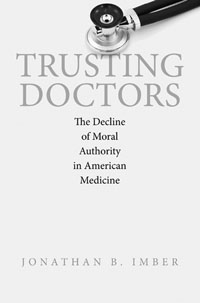Wellesley Professor Writes New Book about Trust and American Medicine
FOR IMMEDIATE RELEASE:
Oct. 17, 2008 |
|
WELLESLEY,
Mass.— For more than a century, the American medical profession insisted that doctors be rigorously trained in medical science and dedicated to professional ethics. Patients revered their doctors as members of a sacred vocation. But do we still trust doctors with the same conviction today?
 In his new book, Trusting Doctors: The Decline of Moral Authority in American Medicine (Princeton University Press, September 2008), Wellesley College’s Jonathan B. Imber provides insights into the religious underpinnings of the doctor-patient relationship and raises questions about the place of the medical profession in American life and culture. In his new book, Trusting Doctors: The Decline of Moral Authority in American Medicine (Princeton University Press, September 2008), Wellesley College’s Jonathan B. Imber provides insights into the religious underpinnings of the doctor-patient relationship and raises questions about the place of the medical profession in American life and culture.
Imber attributes the development of patients' faith in doctors to the inspiration and influence of Protestant and Catholic clergymen during the 19th and early 20th centuries. He explains that as the influence of clergymen waned, and as reliance on medical technology increased, patients' trust in doctors steadily declined.
RAISING AWARENESS: “My aim in Trusting Doctors is to describe not the immorality of doctors, but the decline in their moral authority, that is the decline of their presence in our lives as people we trust with our whole lives,” Imber said. “I do not argue this decline is by any means all negative, but it is not all positive either. And this is my hope for readers: to be more aware and more acknowledging of what is at stake in trusting others, not only when we should not, but when we should.”
At Wellesley, Imber is the Class of 1949 Professor in Ethics as well as a professor of sociology. He is also director of the Program in American Studies. He is the author of an earlier book, Abortion and the Private Practice of Medicine, and editor-in-chief of Society, the international periodical of record in social science and public policy.
Trusting Doctors discusses the emphasis that Protestant clergymen placed on the physician's vocation; the focus that Catholic moralists put on specific dilemmas faced in daily medical practice; and the loss of unchallenged authority experienced by doctors after World War II, when practitioners became valued for their technical competence rather than their personal integrity. Imber shows how the clergy gradually lost their impact in defining the physician's moral character, and how vocal critics of medicine contributed to a decline in patient confidence.
FUTURE CHALLENGES: The author argues that as modern medicine becomes defined by specialization, rapid medical advance, profit-driven industry and ever more anxious patients, the future for a renewed trust in doctors will be confronted by even greater challenges.
"Jonathan Imber's Trusting Doctors is an important, interesting, and readable book,” notes Daniel Callahan, cofounder of the Hastings Center, an independent, nonpartisan, and nonprofit bioethics research institute. “We all know that our modern doctors do not have the social aura they once did. Imber effectively tells us the eye-opening story of why that change has happened."
"Doctors and people who have no choice but to trust doctors – which means all of us – need to read this book,” said Richard John Neuhaus, editor-in-chief of the journal First Things, which examines religions, culture and public life. “With both sympathy and uncompromising honesty, Jonathan Imber traces the frequently troubled history of a medical profession that needs to attend to its increasingly fragile moral authority.”
For more on the book, go to http://press.princeton.edu/titles/8789.html.
Since 1875, Wellesley College has been a leader in providing an excellent liberal arts education for women who will make a difference in the world. Its 500-acre campus near Boston is home to 2,300 undergraduate students from all 50 states and 68 countries.
###
|

